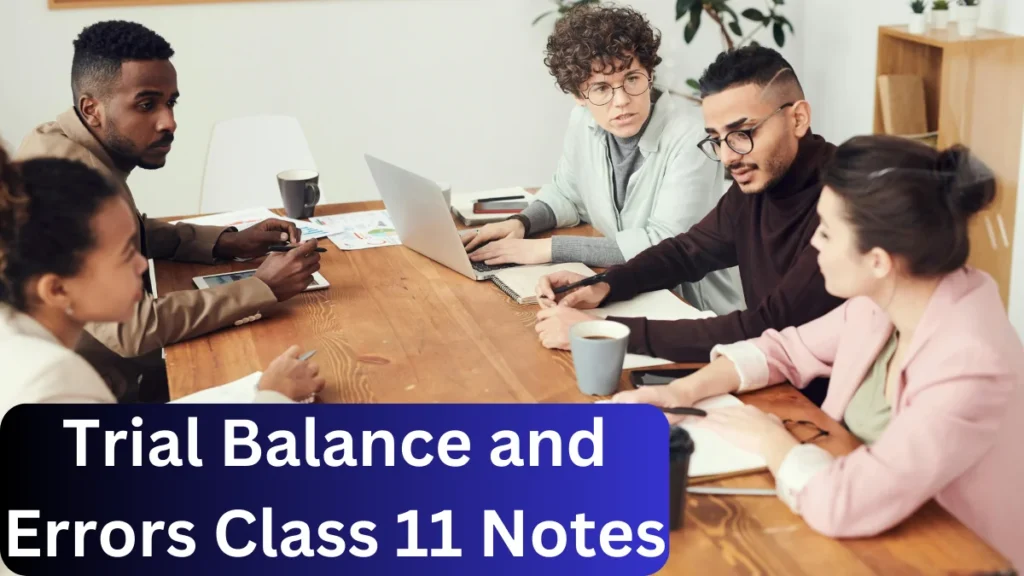
Trial balance is a statement, prepared with the debit and credit balances of ledger accounts to test the arithmetical accuracy of the books. Here are the trial balance and errors class 11 notes.
All the businessmen after completion of postings from the journal to the ledger, want to verify the accuracy of the postings.
For this purpose, a statement is prepared wherein the balances of all the accounts in the ledger are incorporated. The statement so prepared is called ‘Trial Balance’.
Topics Discussed
Features of Trial Balance
- It is a list of balances of all ledger accounts and the cash book.
- It is just a statement and not an account.
- It is neither a part of the double entry system, nor does it appear in the actual books of accounts.
- It can be prepared at any time during the accounting period, say, at the end of every month, every quarter or every year.
- It is always prepared on a particular date and not for a particular period.
- It is prepared to check the arithmetical accuracy of the ledger accounts.
Objectives of Preparing Trial Balance
1) To ascertain the arithmetical accuracy of the ledger accounts
The trial balance provides a useful check on the ledger postings.
2) To help in the detection or location of errors
If a trial balance does not tally, it indicates that some errors have occurred and the accountant will then proceed to locate such errors.
3) To obtain a summary of the ledger accounts
A trial balance serves as a summary of all the ledger accounts. Scanning the trial balance enables one to know the assets, liabilities, expenses, incomes, etc.
4) For the preparation of Final Accounts
As the trial balance contains the list of all the ledger accounts, it provides a basis for further processing of accounting data, i.e., preparation of final accounts namely Trading and Profit & Loss Account and a Balance Sheet.
Preparation of Trial Balance
It may be noted it is always prepared on a particular date and not for a particular period.
In order to prepare a trial balance, all the accounts showing debit balances in the ledger are put on the debit side of the trial balance and the accounts showing credit balances are put on the credit side.
Types of Errors
Errors Affecting Trial Balance
If the trial balance does not tally, it will indicate that certain errors have been committed which have affected the agreement of the Trial Balance.
1) Wrong Casting
If the total of the cash book or some other subsidiary book is wrong, the trial balance will not tally.
2) Posting to the Wrong Side
If instead of posting an amount on the debit side of an account, it is posted on the credit side, or vice versa, the trial balance will not tally.
3) Posting of Wrong Amount
The trial balance will not tally if the posting in an account is made with an incorrect amount.
4) Omission of Posting of One Side of an Entry
For example, if Rs. 100 has been received from Ram and correctly entered in the Cash Book, but if it is omitted to be posted on the credit side of Ram’s Account, the trial balance will not tally.
5) Double Posting in a Single Account
For example, if Rs. 100 has been received from Shyam Lal and correctly entered in the cash book, but if it is posted twice on the credit side of Shyam Lal’s account, the trial balance will not tally.
6) Errors of Totaling and Balancing of Accounts in the Ledger
Errors may occur in the totaling of debit or credit sides of accounts in the ledger or in the balancing of accounts in the ledger.
Rectification of Errors Class 11 Notes
Errors not Affecting the Trial Balance
The main objective of preparing a trial balance is to check the accuracy of the accounts. There are certain errors which do not affect the agreement of the trial balance. Such errors are also called the limitations of trial balance.
1) Error of Omission
If a transaction remains altogether unrecorded either in the journal or in subsidiary books, it will be termed as an error of omission.
2) Error of Commission
If a wrong amount is entered either in the journal or in the subsidiary books, the trial balance will tally because the same amount (though wrong) will be posted in both accounts affected by the transaction.
3) Compensating Errors
If the effect of one error is neutralized by the effect of some other error, such errors are called compensating errors.
4) Error of Principle
When some fundamental principle of Accountancy is violated while recording a transaction, the error is termed an error of principle.
5) Errors of Posting in Wrong
If, while posting from the books of original entry, posting is made to a wrong account not on the correct side, the error will not affect the agreement of Trial Balance.
Suspense Account
Sometimes, in spite of the best efforts of an accountant, all the errors are not located and the Trial Balance does not tally.
In such a situation, the difference in the Trial Balance is placed to a newly opened account known as a “Suspense Account” and the Trial Balance tallies to avoid the delay in the preparation of final accounts.